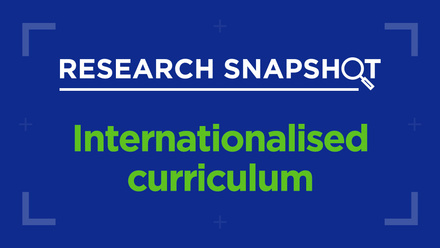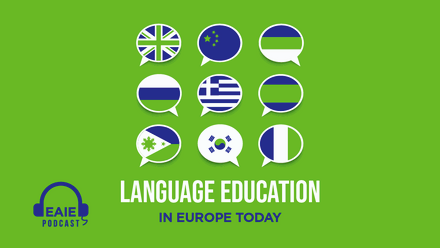Supporting Ukrainian refugees with free language classes: a case study

Since the beginning of the Russian invasion, millions of Ukrainians have left their homes in search of safety abroad. At The Hague Pathway College (THPC) in the Netherlands, where I work as Student Services Manager, we have recently taken the initiative to help my fellow Ukrainians in overcoming the language barrier they face upon arriving in a new country and culture. Through the language courses offered via the Ukrainian Language Project (ULP), we have been able to offer several hundred Ukrainian refugees some sense of normalcy and routine while helping make their lives in the Netherlands a bit easier.
Having already worked in education in the Netherlands for four years, I had the idea to initiate a project that would provide free language courses to Ukrainian refugees at THPC. As a starting point, I asked THPC’s College Director, Stephen Orme, and my team for permission to offer free language courses in English and Dutch to Ukrainians. The aim of the Ukrainian Language Project (ULP) was to support Ukrainian refugees by enabling them to communicate with locals and offering a sense of routine, as well as a forum where they could support each other.
Launching the initiative
The idea was supported straightaway. The Academic Manager, John Mandy, and I have been organising the Ukrainian Language Project together, and we have been running the courses since April 2022. Since we work with The Hague University of Applied Sciences (THUAS), the university was also interested in supporting our project by providing facilities. A large number of university staff was also keen to be involved with the project, so we managed to find volunteers very quickly. There were six teachers of English and five for Dutch language lessons. Some of the volunteers came from THPC and others came from THUAS.
To help Ukrainians fleeing the conflict, one higher education institution in the Netherlands offered free language classes.
Once the teachers and location had been confirmed, the language lessons were advertised on social media. We made banners in Ukrainian, English and Russian with details on how to sign up. We promoted the project through different channels such as Instagram, Facebook and Telegram, as well as the Ukrainian foundation in the Netherlands and Opora. Within 24 hours, there were over 500 requests, which was an amazing surprise for us. However, due to a finite supply of volunteers and their time, at the time we could only offer classes for 300 students.
Filling a gap
We offered English and Dutch language classes, as well as an ‘Introduction to Dutch Culture’ course. There were different levels of English classes (from beginner to upper intermediate), and beginner level Dutch classes. Most of the students were women between 20 and 40 years old, but participants ranged from children up to 70 years.
We were one of the first institutions in the region to offer free classes to Ukrainian refugees. In general, there was a lack of free language courses in the country at that time. Municipalities could not react that quickly as they were simply too busy with other refugee-related tasks, such as accommodation issues. Therefore, many refugees travelled from different cities, such as Tilburg and Amsterdam, as well as The Hague and surrounding regions to follow our courses.
We held an official opening ceremony in May 2022 with students and teachers from the project. We were proud to welcome to this event the Ukrainian Ambassador for the Netherlands, Maxim Kononenko, and the Chair of the Executive Board at The Hague University of Applied Sciences, Elisabeth Minnemann. Their attendance really demonstrated the support from the Ukrainian community in the Netherlands, as well as from THPC and THUAS.
Take-aways
Overall, Ukrainians were very grateful for our courses. The classes were helpful to them to level up their language skills, which provided extra support in the search for a job and building up a new network in a foreign country. As one of our volunteers said: "It’s amazing to be able to offer these classes and support such motivated, inspirational students in a really practical way. After all the upheaval they will have faced recently, seeing the students acquire new skills during the class and build up a network of friends after it has been fantastic."
There are a few recommendations we have for any higher education institution who is thinking about offering classes to refugees in a similar manner. Firstly, it’s important to provide some training and guidance to your teachers before starting the classes. Even if your teachers are very experienced and knowledgeable, teaching refugees is a fairly unique experience and offers a number of challenges, especially if the students have recently arrived to the country and have experienced shock.
Secondly, it is useful for teachers to know beforehand that within their class, they are likely to find students with vastly different motivations. For example, some students are simply looking for a distraction and something new to focus on, and so are happy to chat and socialise. However, other students in the same class might be thinking about their long-term plans, for example, going to university in their new country, which would require an official language certificate.
Finally, it can be useful to create a dedicated email inbox which is specifically used for refugee students to send messages. This helps avoid confusion between your daily emails from your regular students. We were receiving up to 200 emails per day from Ukrainian refugees in the early days of the project, so a separate email inbox proved essential.
We started this initiative to help the new arrivals feel welcome in our city after the unimaginable upheaval they experienced. Without the support of THUAS and THPC staff, as well as the team of volunteers, none of this would have been possible. For a variety of reasons, we did not continue with the courses for this term, due partly to logistical constraints but also to more positive developments such as a large proportion of refugee students finding jobs and more municipalities stepping in to offer more free language classes. In the end, we are glad to have been able to make a small but positive impact on the lives of the students we met, and we hope that other higher education institutions in similar situations can learn from our experience.






